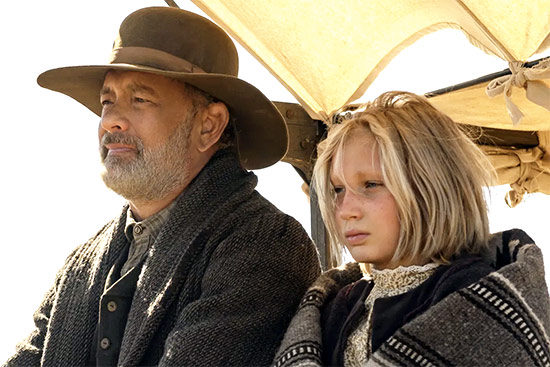Last Updated on March 10, 2024
Some of the best period dramas are those that center around intimate human stories, set against the broader stage of sweeping historical changes. As characters personally experience famous events—say, the Civil War—the viewer comes to understand the true human cost of such developments.

To help keep this site running: Willow and Thatch may receive a commission when you click on any of the links on our site and make a purchase after doing so.
“News of the World,” (2020) starring Tom Hanks and Helena Zengel, outwardly presents a simple story, that of a Civil War veteran begrudgingly returning a young orphan to her relatives in 1870 Texas.
But their story unfolds against the backdrop of Reconstruction and westward expansion, and director Paul Greengrass skillfully uses that setting to reveal the devastation wrought as white Americans remade their country in the aftermath of the Civil War.
“News of the World” is AVAILABLE to STREAM
Based on Paulette Jiles’ 2016 novel, a National Book Award finalist, “News of the World” follows Captain Jefferson Kyle Kidd (Hanks) as he travels from town to town, reading the latest news to anyone willing to pay a dime to listen.
Kidd is an expert performer, selecting human interest stories and the occasional hard-hitting news item (such as the federal government’s decision to enforce the 13th, 14th, and 15th Amendments) based on his assessment of the audience. On his way to the next town, he comes across a half-feral girl dressed in Kiowa clothing and accidentally assumes responsibility for her.
Johanna Leonberger (an astounding Helena Zengel) has been orphaned twice over: first when Kiowa warriors killed her birth family and took her captive, and second when white soldiers killed her Native family and “reclaimed” her. Now Johanna is bound for her only surviving relatives, an aunt and uncle who live 400 miles away. She speaks no English and appears to have assimilated fully into Kiowa culture. When Kidd realizes no one else can or will take responsibility for her, he reluctantly agrees to deliver her to her family.
What follows is, on one level, a superb traditional Western.
Kidd and Johanna face a tense shootout in the Texas foothills, a hellish night with a corrupt county boss, a dust storm, and a runaway wagon. Kidd is the classic reluctant hero with a tragic past, but where another actor might have turned him into a one-note man of little words, Hanks imbues him with pent-up emotion. He’s a man who just wants to forget the terrible things of his past, but when faced with an ethical dilemma he has no choice but to stick to his own rigid moral code.
Johanna is the high-strung wild girl he’s tasked with delivering across a terrifying terrain, but in Zengel’s performance we catch glimpses of the horrific traumas she’s endured. Both actors elevate the film with their portrayals.
But as the unlikely pair get closer to their destination, Greengrass skillfully interweaves settings, images, and moments that illuminate the larger backdrop of this particular historical moment.
Johanna hasn’t simply been orphaned due to white-on-Native violence; soldiers forcibly removed the Kiowa in order to free up their land for white settlers. From a distance we see long trains of Kiowa moving further west, but they’re forever out of reach, just as they are for Johanna. In a heartbreaking early moment, she runs after them in the rain, screaming in Kiowa for them to take her with them. A vast river stands between her and her adoptive family, and she’s abandoned once again.
Neither she nor Kidd truly belong anywhere; he hasn’t returned home to San Antonio in the five years since the Civil War. It’s easier for him to survive as an itinerant news reader than to face his old life and its losses. And everyone in this world has suffered losses, from the former Confederate soldiers who feel betrayed by the federal government’s strict requirements for rejoining the Union, to a saloon owner who’s lost her husband to the allure of California.
What’s unique is how the characters deal with their grief. Many of the angry former soldiers Kidd encounters want to wrest power away from others, to remake the West in their own image by forcibly removing (or killing) Native Americans and Black Americans. Or they distrust the federal soldiers posted in every Texas town and attempt to enact their own forms of justice. Even Kidd struggles to deal with his past, as he insists to Johanna that the only way to make progress is to forget bad memories.
Johanna suggests an alternative: what if you need to face your memories in order to move forward? It’s a revolutionary idea to Kidd, one he tucks away for the film’s ending.
“News of the World” could be considered a small film. It’s finely crafted, tense during action-packed sequences and emotionally moving during the quieter character moments. But its larger value lies in the skillful way it uses its characters to reveal the nasty truths of postbellum western America.
It’s a thought-provoking, beautiful exploration of the lasting impact of trauma and the myriad ways in which humans deal with loss, both personally and as a community.
“News of the World” is AVAILABLE to STREAM
Rated PG-13
Abby Murphy writes young adult books about girls discovering their strengths. A member of SCBWI and The Historical Novel Society, she is represented by Laura Crockett of Triada US Literary Agency. You can visit her blog here, where she writes about reading, writing, history, and her incurable Anglophilia.
If you enjoyed this post, wander over to The Period Films List. You’ll especially like the Best Period Dramas: Victorian Era list.


Nina Lundstedt
August 4, 2021 at 12:36 am (4 years ago)Loved this film. A sweet and heartfelt western-tale! Tom Hanks and Helena Zengel are absolutely wonderful. Beautiful story. Well done!